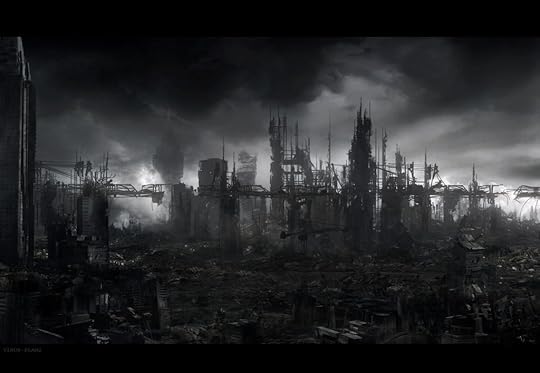The Future is not so Bright: Science Fiction Trending Strongly Towards Apocalypse/Dystopia
In the late 20th century, the future was very bright. You could see it in the culture. Science Fiction emphasized the wonders of space, incredible new technologies, and fascinating new alien species. Our lives would be longer, happier, safer, and easier. Fantasy was about grand kingdoms, heroic kings and knights, the triumph of good versus evil, and love over hate. People were feeling good.
My how things have changed. Science Fiction has veered strongly towards detailing dark futures, apocalyptic events, the fall of humanity, and the return of barbarism. Fantasy has gotten darker as well, focusing more on war, human suffering, and tragic romances. Terrifying creatures populate the most successful fantasy movies, TV shows, and novels.
A search of Amazon’s bestselling Sci-Fi and Fantasy provides evidence of the current trend. The top selling novels include apocalyptic and post-apocalyptic novels like Wool, World War Z, The Host, Ready Player One, and The Hunger Games. In all these novels life for human is about to get worse, in some cases much worse. On the fantasy side, the top seller is A Game of Thrones, a dark, brutal and unromantic epic fantasy.
Hollywood is even worse. The big blockbusters for this year are likely to be Oblivion, After Earth, Pacific Rim, Elysium, and Mad Max. The world is a pretty rough place in all these films. The Hobbit offers some respite from the agony. Before this year, Avatar was the huge Sci-Fi blockbuster, which painted a dismal view of Earth.
This is much different than the days of Star Trek and Star Wars. Both were featured stories of hope. Star Trek was about the triumph of reason over ignorance and hate. In the TV show and the early movies, the future was a wonderful place. Today, everything has changed. The name of the new film says it all, Star Trek Into Darkness. Star Wars Episodes 4-6 (the first three) had their dark moments but the final conclusion was the triumph of the rebellion over the evil empire, and the redemption of Anakin Skywalker. Episodes 1-3, released in the past fifteen years, were about the fall of the republic and Anakin.
I believe the change in the genre is largely a result of the change in times. The great works of Sci-Fi in the 20th century came at the dawn of the space age and the economic prosperity of the 1980s. Today, people across the world have become perhaps a bit pessimistic about the future due to the events in the world.
It started with September 11th, which ended the aura of perfect security and peace in the United States. We found out we were vulnerable and could not escape the scourges of the world. Terrorism and war dulled the excitement around the peace dividend and the information age. The housing bubble and subsequent recession made everyone’s perspective even more bleak.
Even technology scares us. Movies like Terminator 2, The Matrix Trilogy, 28 Days Later, Resident Evil, and Cloud Atlas are about our innovations destroying or enslaving us.
The mood of people these days is dark, and it is clearly reflected in the movies and novels of the times. The biggest consumers of entertainment, younger Americans, also are enduring a time of high unemployment, poor prospects, and crippling student loan debt. Combined with a society that enjoys to drag out adolescence and you have a generation that feels stuck.
We are an uninspired generation. The challenges of our time are not going away and our leaders clearly have no idea how to resolve them.
Just like in the post-apocalyptic and dystopic movies and novels, there is a real chance the future will be a darker and more barbaric place but it doesn’t have to be. It isn’t destiny. There is always hope. There are many things about this world that should encourage us and make us feel that we can overcome these challenges.
Hunger and disease are in decline in nearly every part of the world. Despite the wars in Iraq and Afghanistan, total deaths worldwide from combat are at historic lows. An individual has access to near infinite amounts of information today thanks to the internet, the personal computer, the cellular phone, and other incredible innovations. Poverty has dramatically declined in Latin America, Asia, and parts of Africa. And although the past few years have seen some setbacks, freedom remains on the rise in the world.
I think it is very possible that we can overcome the challenges before us and avoid the dark futures we see in movies and read about in novels. When it happens, there very well could be a change in the themes of Sci-Fi and Fantasy. After all, they are speculative fiction and when people are in a good mood, they are more likely to speculate about positive things. When that happens we’ll see works more like A New Hope rather than the Revenge of the Sith, more like The Hobbit and less like A Game of Thrones.
Jacob
The post The Future is not so Bright: Science Fiction Trending Strongly Towards Apocalypse/Dystopia appeared first on Jacob Foxx.




